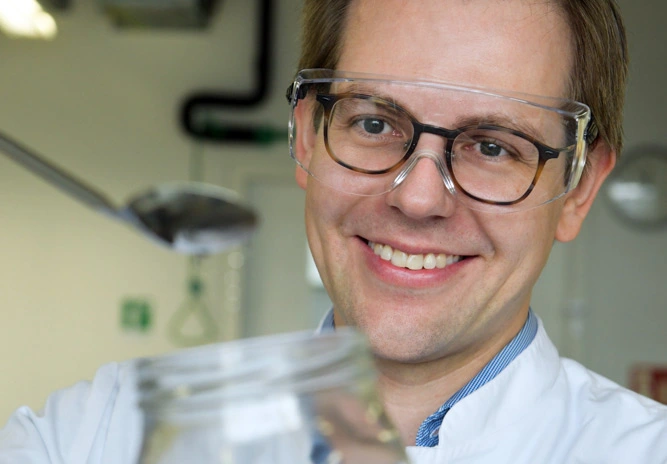Fair resources
Tungsten Consulting is developing procedures for environmentally friendly chemical processing of raw materials – such as graphite, large amounts of which are used in batteries
Storage batteries are in high demand: for cars and bikes used in electromobility as well as mobile electronics devices. The benefits for climate protection and health are heavily advertised but not many like to talk about the resource consumption and the burdens connected to it. ‘There are countless steps in manufacturing that could be improved to create a truly sustainable product,’ says Till Wolfram, the founder of Tungsten Consulting, a company that moved into the Centre for Photovoltaics and Renewable Energies in summer 2018.
In their office and lab spaces on the centre’s second floor, the PhD chemist and his two employees offer research and development as well as consulting for new business concepts. Graphite, the pure carbon used in pencils, is one key issue: ‘Graphite is needed for the anodes of lithium-ion batteries, the market for this is growing rapidly,’ says Wolfram. Most of the demand is met by China, followed by Brazil, Canada, and India. However, in view of the rising demand, many more mining companies have their eyes on this business field. Wolfram is in contact with a company planning to exploit a deposit in Australia. In addition to the geological requirements, the company seeks to know more about the efforts involved with bringing the desired pure graphite, with an impurity of less than 0.05 percent, to market.
‘Usually we use hydrochloric acid to dissolve impurities like quartz. But hydrochloric acid is highly toxic and, if used incorrectly, also an environmental toxin,’ says Wolfram. Using sodium hydroxide and additional processing steps, the scientist has developed an alternative procedure to an extent that will facilitate the effective mining of the materials contained in the Australian depot. ‘It enables us to circumvent the use of hydrochloric acid and safeguard resource-friendly production.’ For a long time, when it came to questions of a product’s origin, the focus was on agricultural products. Increasingly, consumers want to know how other products are produced and at which costs for the environment and the people of the origin countries. ‘There is a rise in awareness and it is affecting manufacturers. However, the additional costs can only be moderate at best,’ he says.
His goal is to contribute to this by focusing on small and medium-sized companies for joint projects. In addition to graphite, the company also deals with other minerals and their processing, including tungsten ore, says the 38-year-old with a wink. Incidentally, his last name, Wolfram, is the German word for tungsten, the shiny heavy metal that he named his company after. He founded the firm in 2018 after obtaining a degree in chemistry from Free University and a PHD at the Fritz Haber Institute of the Max Planck Society, which are both located in the Western part of Berlin.
The good working conditions lured him to Adlershof. ‘Here, I could use a lab that was already stocked with fundamental lab equipment like a fume hood and lab tables.’ Especially for founders with high investments, this as a real opportunity. ‘Also, I had the chance to grow without having to rent a large space right off the bat,’ says Wolfram. Meanwhile, Tungsten Consulting has now indeed rented additional space at the Centre for Photovoltaics and Renewable Energies as well as the Centre for Biotechnology and the Environment II. The concept was successful and new projects are coming in, including on mineral processing, optimisation of fuel cells, or recycling of electronic waste. ‘Since raw materials are a necessity for our society and the challenges of the future,’ says Wolfram, ‘we should use them as efficiently as possible. This includes widespread recycling.’
By Ralf Nestler for Adlershof Journal
